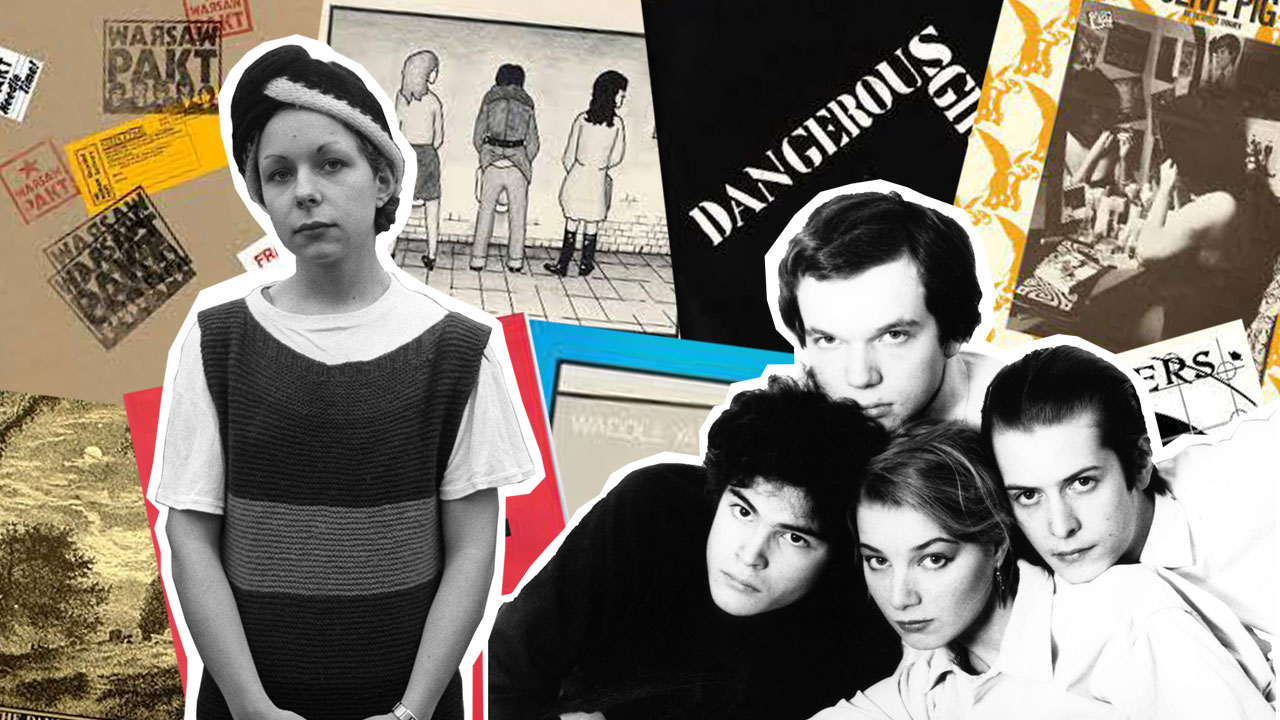Next month marks 45 years since the legendary 100 Club Punk Festival of September 1976. Essentially punk's coming out party, it marked the beginning of a pop pandemic which prompted thousands of bands to form overnight — all of whom prized anger as an energy and imagination over technical ability.
Here, then, are ten brilliant but rarely mentioned bands from punk’s first wave who, unlike The Rezillos, never made it to Top Of The Pops.

1) Warsaw Pakt
With a singer, in Jimmy Coull, to rival The Ruts’ Malcolm Owen for razor-gargling menace, this short-lived London outfit were Mary Whitehouse's worst nightmare brought to life. Boasting impeccable underground credentials – drummer Lucas Fox had played with Motorhead, while The Deviants’ Mick Farren supplied suitably provocative lyrics – their 1978 debut album Needle Time remains an urgent reminder of punk’s potential as a catalyst for change. Grainy footage of the Pakt performing key track Dog Fight also confirms they looked as good as they sounded.
2) Stinky Toys
Fronted by 17-year-old singer Elli Medeiros — who had only moved to France from her native Uruguay at 14 — this photogenic Paris outfit were at the forefront of punk’s first wave. However, despite playing the 100 Club Punk Festival at the invitation of Malcolm McLaren and scoring a Melody Maker cover, their label, Polydor, decided against releasing their debut album in the UK. With Andy Warhol as an admirer success still seemed assured, but inter-band tensions over trouble at their gigs saw them split up in 1979. Key track Plastic Faces, however, remains a euro-punk classic.
3) Rudi
Widely recognised as Belfast’s first punk band, Rudi deserve to be so much more than a footnote to the scene which spawned Stiff Little Fingers. Having gained local notoriety with rabble-rousing anthem Cops — written about the ‘punks versus police’ riot following the cancellation of The Clash’s October 1977 gig at Ulster Hall — they signed to Terri Hooley’s Good Vibrations label before a move to London and label hassles precipitated a premature break-up in 1982. None of which detracts from their effervescent 1978 debut single Big Time being a pop-punk masterpiece.
4) The Avengers
This female-fronted San Francisco outfit impressed The Sex Pistols’ Steve Jones so much during their support slot at the band’s final gig at the city’s Winterland Ballroom in January 1978 that he produced their final EP the following year. It’s their 1977 debut single We Are The One, however, which guarantees their inclusion in lists like this, frontwoman Penelope Houston satirising messianic cult leaders and their followers in lines like: “Open your eyes, they tell you lies and you sing along!”
5) Dangerous Girls
“Magazine glamour / Gonna hit you like a hammer!” screams singer Michael Cooper on this Birmingham outfit’s eponymous 1979 debut single, a brilliant slow-burning examination of teen obsession set to a dub-reggae rhythm.
However, despite a string of singles and support slots with local luminaries The Beat and Dexy’s Midnight Runners, the Girls split up in 1982. Teenagers until the end of time, however, will still relate to early B-side I Don’t Want To Eat With The Family, where Cooper declares: “I don’t want to eat anything that’s good for me!”
6) Girls At Our Best!
In the early months of 1980, these Peel favourites summed up the mood of every cash-strapped student in Britain with debut single Going Nowhere Fast.
“My baby’s buying me another life!” declares singer Judy ‘Jo’ Evans in a striking rejection of the newly elected Conservative leader’s capitalist credo, while the post-punk backdrop provided the blueprint for everyone from Elastica to Franz Ferdinand. Despite a string of equally spiky indie hits, the age-old problem of ‘musical differences’ led to GAOB splitting shortly after the 1981 release of debut album Pleasure.
7) Clive Pig
Before punk became a catch-all term for anyone expressing noisy disaffection, it was a gateway for mavericks of all descriptions to gain attention. A case in point being St Albans punk poet Clive Pig. In August 1979, his debut single Happy Birthday Sweet Sixteen was a Peel show regular alongside the likes of Swell Maps, The Tearjerkers and The Cravats. A laceratingly accurate depiction of teenage anxieties set to a jaunty ska rhythm, it deserved to be a Top Ten hit. Forty years on, its genius remains undimmed.
8) Essential Logic
Formed by saxophonist Lora Logic after her expulsion from X-Ray Spex, Essential Logic remain a unique presence in British pop — their free-wheeling collision of punk-funk, folk, free jazz and reggae unlike anything before or since. 1980 single Music Is A Better Noise exemplifies their anything goes approach, while debut album Beat Rhythm News suggests an impromptu brainstorming session between Kate Bush, Talking Heads and Captain Beefheart. Sadly their eccentric genius was short-lived, the band spitting up in 1981.
9) Apartment
This little-known Bristol outfit made their first appearance on 1979’s legendary Avon Calling compilation album.
However, it was the following year’s double A-sided single The Car/Winter which endeared their brooding pop-punk to listeners to John Peel’s show. Sadly, they split up the same year. Mainman Alan Griffiths later formed The Escape before becoming songwriting foil for Tears For Fears’ Roland Orzabal, prior to an untimely death at just 57 in 2017.
10) The Dancing Did
These Evesham oddballs briefly threatened to breach the charts with brilliant 1981 single The Lost Platoon — every bit as bonkers as Tenpole Tudor’s top ten smash of the same year, Swords Of A Thousand Men (also on Stiff). While earlier releases on their own Fruit & Veg label had established their unique sound — once described by NME as “pastoral Edwardian rockabilly” — the Did’s solitary album, 1982’s And Did Those Feet, failed to capture the anarchic mayhem of live shows which combined the attitude of The Clash with the lyrical obsessions of Steeleye Span — see footage from a performance on Look! Hear!, introduced by Toyah.
